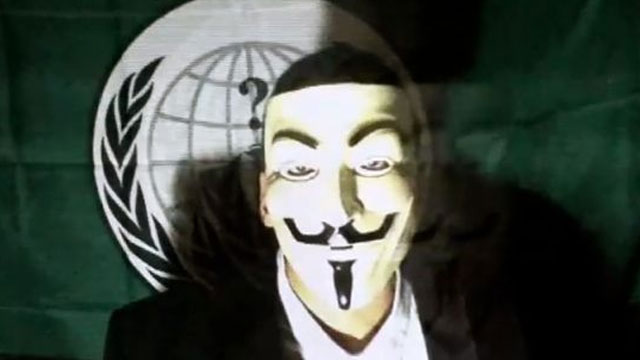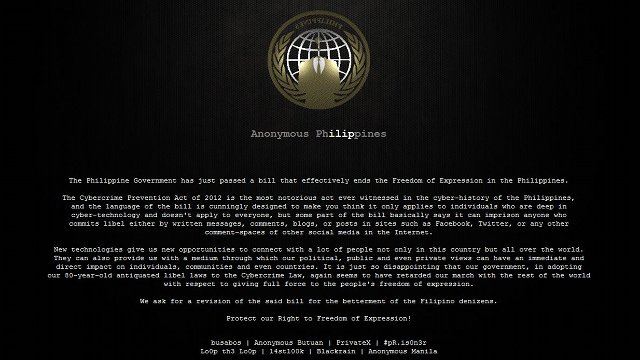SUMMARY
This is AI generated summarization, which may have errors. For context, always refer to the full article.

MANILA, Philippines – Hackers who call themselves Anonymous have, in around half a decade, made an internationally infamous name.
Even before attacking Philippine government websites until Thursday morning, September 27, the loose hacking collective called Anonymous has perpetrated cyber attacks in the United States and other countries.
Anonymous is known for pushing for issues like freedom of expression, as when the group Anonymous Philippines hacked local websites to protest the Cybercrime Prevention Act of 2012. Two years ago, Rappler executive editor and CEO Maria Ressa had reported on a video declaring the group’s mission.
“Anonymous, as a distributed consciousness, is focused on protesting peacefully for freedom of expression on the Internet. We ask the world to support us, not for our sake, but for your own. When governments control information, they control you,” said a sci-fi voice in a Youtube video by Anonymous, which was quoted in Ressa’s piece, “Inside the World of Anonymous Attacks.”
One of their most high-profile causes, in 2010, was to support Wikileaks and its founder William Assange by hacking sites that “censor” Wikileaks. These included sites like PayPal and Visa.
‘Civil disobedience’
Starting around 2006, Anonymous has perpetrated what it calls “this generation’s civil disobedience,” according to Ressa. They have called themselves “hacktivists,” and have attacked crucial sites like those of the US Department of Justice and the governments of Tunisia and Yemen.
Earlier in September this year alone, the Anonymous-affiliated group AntiSec claimed it has gotten data from 12-M users of the Apple iPhone and iPad. The group said it did this by breaching a Federal Bureau of Investigation (FBI) computer.
“My suspicion is that the hackers were more interested in embarrassing the FBI’s team than endangering innocent users,” said Graham Cluley, who belongs to the British security firm Sophos.
In August, the group Anonymous also said it shut down a computer server of Australia’s domestic spy agency, the Australian Security Intelligence Organization. Its actions briefly closed down access to the spying firm’s public webpage.
Protesting Cybercrime Law
Then on Wednesday night, September 26, the group Anonymous Philippines launched an attack against major Philippine websites – those of the Central Bank and the Metropolitan Waterworks and Sewerage System. The hackers protested the Cybercrime Law.

Past midnight on Thursday, the websites of the Philippine Anti-Piracy Team and the American Chamber of Commerce in the Philippines likewise fell victim to Anonymous. The group also hacked at least two websites of the Department of Health.
It is unclear if the recent hacking spree is directly linked to the global Anonymous movement, but the Philippine hackers did draw leverage from the Anonymous brand name. Anonymous Philippines also attracted international attention by hacking the Bangko Sentral ng Pilipinas website, which is frequented by international bankers and finance managers.
The group stressed that the Cybercrime Law “effectively ends” freedom of expression in the Philippines.
“The Cybercrime Prevention Act of 2012 is the most notorious act ever witnessed in the cyberhistory of the Philippines, and the language of the bill is cunningly designed to make you think it only applies to individuals who are deep in cybertechnology and doesn’t apply to everyone. (But) some part of the bill basically says it can imprison anyone who commits libel either by written messages, comments, blogs, or posts in sites such as Facebook, Twitter, or any other comment-spaces of other social media in the Internet,” the hackers posted on the sites it defaced.
What will happen next after this form of hacktivism?
The Cybercrime Law, after all, penalizes computer-related fraud, which is defined as “the unauthorized input, alteration, or deletion of computer data or program or interference in the functioning of a computer system, causing damage thereby with fraudulent intent.” (Read the Cybercrime Law below.)
With the new law, can the government punish the underground group? The hacktivists’ message, in any case, is consistent and clear: protect freedom of speech. – Rappler.com
Add a comment
How does this make you feel?
There are no comments yet. Add your comment to start the conversation.